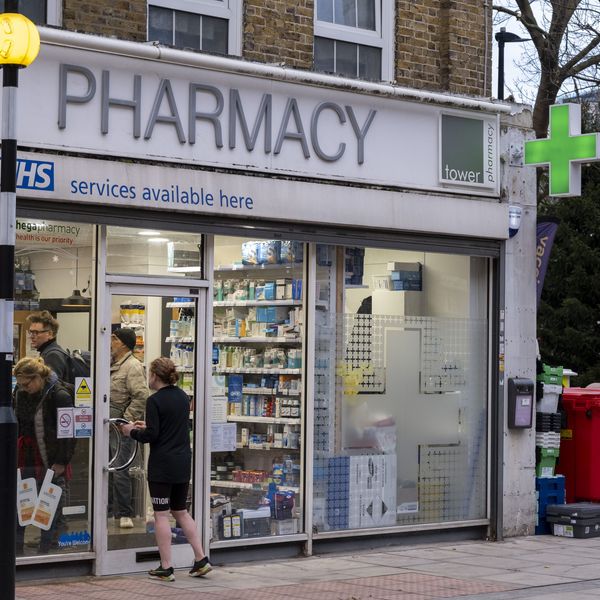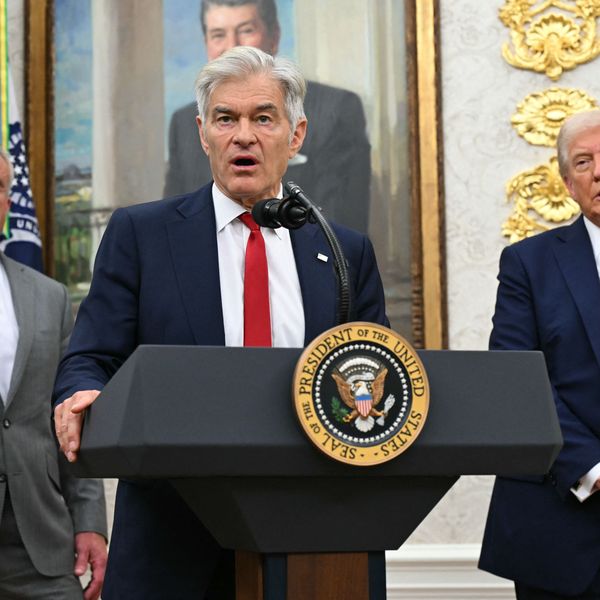Big Pharma Preps to Spend Hundreds of Millions to Keep Drug Prices High
"PhRMA's decision to hike membership dues 50 percent will increase the trade group's considerable coffers to more than $300 million per year," Politico reports
Facing an increasingly outraged public, the leading Big Pharma lobby group is hiking its annual dues by more than 50 percent as it prepares to defend its pharmaceutical company members against lawmakers and voters who want to rein in out-of-control drug prices.
Politico reported Tuesday that "PhRMA hopes to improve its public image next year and stave off any legislative action" in the wake of recent public scandals like those over EpiPen and Valeant. "It plans to run TV ads emphasizing how new drugs could add years to patients' lives, as well as the years of complex research needed to develop a drug--in other words, a lot of money that must be recouped through high prices."
To do so, it needs some extra cash.
As such, "PhRMA's decision to hike membership dues 50 percent will increase the trade group's considerable coffers to more than $300 million per year," according to Politico, "a financial advantage it hasn't enjoyed since 2009, when drug makers came out largely unscathed in Obamacare negotiations."
Politico first reported on PhRMA's board voting to raise dues in August, but didn't know then by how much. "They are formidable under any scenario. They are formidable now," Hillary Clinton health policy adviser Chris Jennings said at the time. "The idea that they are going to bring in more resources, borders on petrifying."
But an angry public, led by progressive voices, is potentially just as formidable.
A recent poll found that more than three in four Americans believe that prescription drug prices are "unreasonable," with large majorities from both major political parties in favor of government steps to keep those prices down.
On Monday, STAT reported that "a coalition of 300 institutional investors has filed shareholder resolutions with 11 big U.S. drug makers to explain and justify all price increases and the risks these may pose to stockholders."
And just last week, Sen. Bernie Sanders (I-Vt.) penned an op-ed in favor of the California Drug Price Relief Act, also known as Proposition 61, which seeks to rein in prescription drug prices. Voting yes on Proposition 61, he wrote on Friday, would not only help "make medicine more affordable in California," but would also "send a signal to Washington that the whole nation's prescription drug policies need an overhaul."
Big Pharma has been ardently fighting that measure, as Politico reports--though polls suggest the ballot measure is still poised to win.
On Tuesday, Sanders tweeted in response to the Politico piece:
\u201cHow have drug companies gotten away with charging the highest prices in the world? By spending $300 MILLION a year. https://t.co/7RxyTaHsX5\u201d— Bernie Sanders (@Bernie Sanders) 1477407364
And he pushed back on the narrative that Big Pharma is likely to employ in its effort to clean up its image.
\u201cActually 89 out of the top 100 pharmaceutical corporations spent more on marketing and sales than on R&D. https://t.co/fUvMoTCUV2\u201d— Bernie Sanders (@Bernie Sanders) 1477417604
As the group Health GAP, which campaigns for HIV drug access worldwide, wrote Tuesday on Twitter: "PhRMA is filling a war chest & preparing for battle to keep drug prices high. We need to be prepared to fight back!"
An Urgent Message From Our Co-Founder
Dear Common Dreams reader, The U.S. is on a fast track to authoritarianism like nothing I've ever seen. Meanwhile, corporate news outlets are utterly capitulating to Trump, twisting their coverage to avoid drawing his ire while lining up to stuff cash in his pockets. That's why I believe that Common Dreams is doing the best and most consequential reporting that we've ever done. Our small but mighty team is a progressive reporting powerhouse, covering the news every day that the corporate media never will. Our mission has always been simple: To inform. To inspire. And to ignite change for the common good. Now here's the key piece that I want all our readers to understand: None of this would be possible without your financial support. That's not just some fundraising cliche. It's the absolute and literal truth. We don't accept corporate advertising and never will. We don't have a paywall because we don't think people should be blocked from critical news based on their ability to pay. Everything we do is funded by the donations of readers like you. Will you donate now to help power the nonprofit, independent reporting of Common Dreams? Thank you for being a vital member of our community. Together, we can keep independent journalism alive when it’s needed most. - Craig Brown, Co-founder |
Facing an increasingly outraged public, the leading Big Pharma lobby group is hiking its annual dues by more than 50 percent as it prepares to defend its pharmaceutical company members against lawmakers and voters who want to rein in out-of-control drug prices.
Politico reported Tuesday that "PhRMA hopes to improve its public image next year and stave off any legislative action" in the wake of recent public scandals like those over EpiPen and Valeant. "It plans to run TV ads emphasizing how new drugs could add years to patients' lives, as well as the years of complex research needed to develop a drug--in other words, a lot of money that must be recouped through high prices."
To do so, it needs some extra cash.
As such, "PhRMA's decision to hike membership dues 50 percent will increase the trade group's considerable coffers to more than $300 million per year," according to Politico, "a financial advantage it hasn't enjoyed since 2009, when drug makers came out largely unscathed in Obamacare negotiations."
Politico first reported on PhRMA's board voting to raise dues in August, but didn't know then by how much. "They are formidable under any scenario. They are formidable now," Hillary Clinton health policy adviser Chris Jennings said at the time. "The idea that they are going to bring in more resources, borders on petrifying."
But an angry public, led by progressive voices, is potentially just as formidable.
A recent poll found that more than three in four Americans believe that prescription drug prices are "unreasonable," with large majorities from both major political parties in favor of government steps to keep those prices down.
On Monday, STAT reported that "a coalition of 300 institutional investors has filed shareholder resolutions with 11 big U.S. drug makers to explain and justify all price increases and the risks these may pose to stockholders."
And just last week, Sen. Bernie Sanders (I-Vt.) penned an op-ed in favor of the California Drug Price Relief Act, also known as Proposition 61, which seeks to rein in prescription drug prices. Voting yes on Proposition 61, he wrote on Friday, would not only help "make medicine more affordable in California," but would also "send a signal to Washington that the whole nation's prescription drug policies need an overhaul."
Big Pharma has been ardently fighting that measure, as Politico reports--though polls suggest the ballot measure is still poised to win.
On Tuesday, Sanders tweeted in response to the Politico piece:
\u201cHow have drug companies gotten away with charging the highest prices in the world? By spending $300 MILLION a year. https://t.co/7RxyTaHsX5\u201d— Bernie Sanders (@Bernie Sanders) 1477407364
And he pushed back on the narrative that Big Pharma is likely to employ in its effort to clean up its image.
\u201cActually 89 out of the top 100 pharmaceutical corporations spent more on marketing and sales than on R&D. https://t.co/fUvMoTCUV2\u201d— Bernie Sanders (@Bernie Sanders) 1477417604
As the group Health GAP, which campaigns for HIV drug access worldwide, wrote Tuesday on Twitter: "PhRMA is filling a war chest & preparing for battle to keep drug prices high. We need to be prepared to fight back!"
Facing an increasingly outraged public, the leading Big Pharma lobby group is hiking its annual dues by more than 50 percent as it prepares to defend its pharmaceutical company members against lawmakers and voters who want to rein in out-of-control drug prices.
Politico reported Tuesday that "PhRMA hopes to improve its public image next year and stave off any legislative action" in the wake of recent public scandals like those over EpiPen and Valeant. "It plans to run TV ads emphasizing how new drugs could add years to patients' lives, as well as the years of complex research needed to develop a drug--in other words, a lot of money that must be recouped through high prices."
To do so, it needs some extra cash.
As such, "PhRMA's decision to hike membership dues 50 percent will increase the trade group's considerable coffers to more than $300 million per year," according to Politico, "a financial advantage it hasn't enjoyed since 2009, when drug makers came out largely unscathed in Obamacare negotiations."
Politico first reported on PhRMA's board voting to raise dues in August, but didn't know then by how much. "They are formidable under any scenario. They are formidable now," Hillary Clinton health policy adviser Chris Jennings said at the time. "The idea that they are going to bring in more resources, borders on petrifying."
But an angry public, led by progressive voices, is potentially just as formidable.
A recent poll found that more than three in four Americans believe that prescription drug prices are "unreasonable," with large majorities from both major political parties in favor of government steps to keep those prices down.
On Monday, STAT reported that "a coalition of 300 institutional investors has filed shareholder resolutions with 11 big U.S. drug makers to explain and justify all price increases and the risks these may pose to stockholders."
And just last week, Sen. Bernie Sanders (I-Vt.) penned an op-ed in favor of the California Drug Price Relief Act, also known as Proposition 61, which seeks to rein in prescription drug prices. Voting yes on Proposition 61, he wrote on Friday, would not only help "make medicine more affordable in California," but would also "send a signal to Washington that the whole nation's prescription drug policies need an overhaul."
Big Pharma has been ardently fighting that measure, as Politico reports--though polls suggest the ballot measure is still poised to win.
On Tuesday, Sanders tweeted in response to the Politico piece:
\u201cHow have drug companies gotten away with charging the highest prices in the world? By spending $300 MILLION a year. https://t.co/7RxyTaHsX5\u201d— Bernie Sanders (@Bernie Sanders) 1477407364
And he pushed back on the narrative that Big Pharma is likely to employ in its effort to clean up its image.
\u201cActually 89 out of the top 100 pharmaceutical corporations spent more on marketing and sales than on R&D. https://t.co/fUvMoTCUV2\u201d— Bernie Sanders (@Bernie Sanders) 1477417604
As the group Health GAP, which campaigns for HIV drug access worldwide, wrote Tuesday on Twitter: "PhRMA is filling a war chest & preparing for battle to keep drug prices high. We need to be prepared to fight back!"

